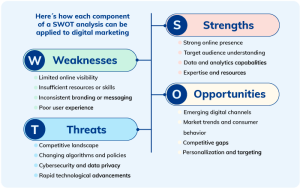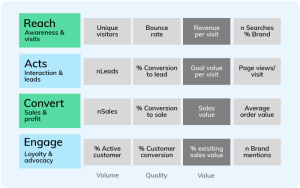
43% MORE CONVERSIONS USING A DIGITAL MARKETING PLAN FOR 2024 (AND HOW TO MAKE ONE)
Building a solid digital marketing plan is like having a roadmap for your business—it guides you on where to go, how much to spend, and the best ways to get there.
But here’s the thing: many folks fall into the trap of trying too many marketing tricks all at once, and they end up spending more money than they should. And guess what? That often leads to not-so-great results.
So, what’s the secret sauce to avoid that mess? So how can you prevent that? Simple: Creating a powerful marketing plan!
What is a Digital Marketing Plan?
A digital marketing plan is like a roadmap for your online marketing goals. It lays out what you want to achieve, how you’re going to do it, and the strategies you’ll use. The main aim is to connect your advertising efforts with your business goals, track how well things are going, and tweak your approach for better results.
This plan can include a bunch of online platforms like your website, social media, emails, SEO (so people can find you on Google), PPC (paid ads), content, videos, and more.
If you’re a business looking to boost your online presence, connect with more customers, and make more money, putting together a digital marketing plan is a must-do.
How to Build Your Digital Marketing Plan
1.Marketing Plan Summary:
-
- Main Marketing Goals:
Clearly outline the primary objectives you aim to achieve through your marketing efforts. - Company Growth Overview:
Provide a succinct snapshot of the growth your company has experienced, emphasizing key milestones and achievements. - Next Steps in Business Development:
Articulate the strategic steps you intend to take to propel your business forward in the near future. - Brand Differentiation (Unique Selling Proposition – USP):
Highlight what sets your brand apart from competitors, showcasing your unique value proposition-
- This summary should be brief and engaging to get a clear overview of your marketing plan without getting getting too caught up in details.
-
- Main Marketing Goals:
2.Action Plan
In your action plan you’ll want to match each goal with a purpose and how you will measure each ones performance.
- Write a brief description of the initiative and its goal.
- Show how it aligns with your marketing objectives.
- Identify the target audience or market segment.
- Define KPIs to measure the performance.
- Estimate ROAS and prioritize initiatives.
This will help you plan your growth initiatives effectively and efficiently.
3.Target Audiences:
-
- Customized Targeting Strategies:
- Align marketing goals with tailored targeting strategies for online traffic.
-
Buyer Personas:
-
Develop multiple buyer personas for distinct market segments.
-
Support personalized marketing campaigns and content based on audience needs and preferences.
-
Creating Buyer Personas:
-
Utilize market research through surveys, questionnaires, or interviews.
-
Ask relevant questions to gather valuable information.
-
Understand how your product/service addresses audience pain points.
-
Analyze and summarize research findings
-
- Incorporating Buyer Personas into the Marketing Plan:
- Describe each persona’s background, demographics, goals, pain points, desired features, and preferred content.
- Uniqueness of Product/Service:
- Conduct a comprehensive analysis of competitors.
- Gather insights into their market situation, team, marketing strategy, content, growth, customers, and market share.
- Learning from Competitors:
- Identify competitors’ strengths and weaknesses.
- Use this information to find growth opportunities and determine areas where your product or service can offer something unique.
-
- Customized Targeting Strategies:
Pro-tip: Document your findings about competitors, particularly strengths and weaknesses of their products/services
4. Your Go-To Marketing Strategy:
Ensure you have a comprehensive understanding by considering the following questions:
-
-
- Set Clear Goals and Conduct a SWOT Analysis:
- Clearly define your goals.
- Perform a SWOT analysis covering strengths, weaknesses, opportunities, and threats.
- Know Your Target Market and Optimize Channel Selection:
- Understand your target market thoroughly.
- Choose the most effective channels to reach your audience.
- Competitor Analysis:
- Conduct a thorough analysis of your competitors.
- Understand their strengths and weaknesses to identify opportunities and threats.
- Create Your Unique Value Proposition (UVP)
- Develop a compelling UVP.
- Clearly articulate why your product or service stands out and is exceptional.
- Set Clear Goals and Conduct a SWOT Analysis:
-
By addressing these key areas, you can build a clearer picture and ensure that no crucial aspects are overlooked in your marketing strategy.

-
-
- Advertising Spend:
- Budget:Keep your advertising budget in check like a financial pro—making sure you’re spending just right by keeping a close eye on what’s planned versus what’s actually spent.
- Marketing Platforms:
- Smart Navigation Picture your marketing journey like a savvy traveler—know your target audience, set a clear budget, and explore marketing avenues such as emails, SEO, social media, content, and ads with a clear goal in mind.
- Automation, AI & Technology:
- Tech Excellence: When choosing marketing tools, think of it like picking the right tools for a job—go for ones that easily work together, can grow with your business, are user-friendly, and keep your data safe and sound.
- AI Impact on Google Ads and Digital Marketing:
- Digital Evolution: Imagine AI as a digital helper—changing the game in how Google Ads and digital marketing work, making things smarter and more effective.
- Taking Your Marketing Plan Further: If you want to take your digital marketing plan up a notch. Here are a few things to keep in mind before you make your plan.
- Define Mission & Values:
- Your marketing plan should start with your mission and values. This shows your reader why you do what you do and how it aligns with your brand. Be specific and clear, but don’t exaggerate.
- This helps your reader understand your business objective, goals and plans better.
- Your Story: Share your business story in simple terms—let people know why you do what you do and how it connects with them.
- Define Mission & Values:
- Advertising Spend:
-
Set KPIs : To track your marketing goals, you need to set clear and measurable KPIs. These are the numbers and timelines that show how well your campaigns are working and if they meet your expectations.

- Key Performance Indicators (KPIs) Examples:
- ROAS:
- Evaluate advertising effectiveness through Return on Advertising Spend.
- New Leads/Purchases:
- Track acquisition of new leads or customers.
- %Increase in Revenue:
- Monitor percentage growth in revenue.
- Lower Bounce Rate:
- Aim for a reduced bounce rate to enhance website engagement.
- More Articles per Week/Month:
- Ensure consistent and relevant content production.
- New Users through Organic Marketing:
- Assess success in attracting and retaining new users organically.
- New Followers Each Month on Social Media:
- Gauge social media growth and engagement through new followers.
- ROAS:
Setting these KPIs prior to planning enhances communication and sets the stage for successful outcomes.
- State Your Marketing Strategy and Initiatives : Your marketing plan should succinctly outline key sections, making prospects curious. For content marketing:
- Content Type:- Specify formats like blogs, webinars, videos, infographics, ebooks, etc.
- Content Volume:- Outline content creation frequency for consistency
- Distribution Channels:- Identify chosen social media platforms for content distribution.
- Paid Ads:- Define budget and placement strategy for paid advertisements.
- KPIs:- Clearly articulate success metrics like traffic, conversions, leads, etc.
Creating a Digital Marketing Plan for 2024
A well-thought-out marketing plan is essential for your business’s success online (we repeat this for emphasis). It helps align your goals with your overall business vision, providing a clear roadmap. Additionally, it allows you to experiment, measure results, and refine your marketing strategies to effectively connect with your audience in a way that resonates with their needs. Schedule a call with our team to discuss your Digital Marketing requirements for 2024 and Digiheave will assist to make it a success.


